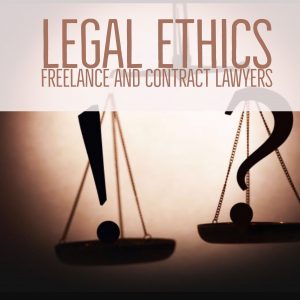 Should California law firms be concerned about violating ethical rules prohibiting aiding and abetting in the unlawful practice of law when they use an out-of-state freelance lawyer not barred in California on a legal project? The short answer is no, as long as the hiring law firm is a member of the state bar, and retains control over the representation and exercises independent judgment in reviewing the out-of-state lawyer’s work.
Should California law firms be concerned about violating ethical rules prohibiting aiding and abetting in the unlawful practice of law when they use an out-of-state freelance lawyer not barred in California on a legal project? The short answer is no, as long as the hiring law firm is a member of the state bar, and retains control over the representation and exercises independent judgment in reviewing the out-of-state lawyer’s work.
“No person shall practice law in California unless the person is an active member of the State Bar.” Cal. Bus. Prof. Code § 6125. Further, under California Rule of Professional Responsibility 1-120, no member of the State Bar may “assist in, solicit, or induce any violation” of the rules of professional conduct or the state bar. California Rule of Professional Conduct 1-300(A) states, “A member shall not aid any person or entity in the unauthorized practice of law.”
These ethical rules apply when a California law firm contracts with attorneys not admitted in California or uses a Legal Process Outsourcing (“LPO”) company that employs off-shore individuals or out-of-state attorneys. See Birbower, Montalbano, Condon & Frank, PC v. Superior Court, (1998) 17 Cal.4th 119 (refining the scope of the unauthorized practice of law to include legal work by New York attorneys in connection with prospective private arbitration in California). While the State Bar Act does not define the practice of law, Courts have discussed its meaning. In Birbower, the Court held, “The primary inquiry is whether the unlicensed lawyer engaged in sufficient activities in the state or created a continuing relationship with the California client that included legal duties and obligations.” Birbower, (1998) 17 Cal.4th 119, 129.
California ethical rules permit law firms to contract for certain legal services by attorneys not licensed in California, including drafting legal pleadings, as long as the law firm remains ultimately responsible for the final work product. Jacob v. State Bar, 19 Cal. 3d 359, 363 (1977); People v. Perez, 24 Cal. 3d 133, 143 (1979).
Winterrowd v. Am. Gen’l Annuity Ins., 556 F.3d 815 (9th Cir. 2009) is instructive on this issue. In Winterrowd, a lawyer barred in Oregon but not in California assisted a California lawyer litigating a case before the United States District Court for the Central District of California. The Oregon attorney did not “appear” before the court, did not sign any pleadings, and had little contact with opposing counsel or clients, and the California attorney supervised the Oregon attorney. The court held that there was no ethical violation under these circumstances. See Orange County Bar Association Formal Opinion 2014-1 (concluding that “the mere act of Out-of-State Lawyer’s ghostwriting a document for California Counsel of Record is not likely to constitute the unauthorized practice of law in California.”); San Diego County Bar Association Ethics Opinion 2007-1 (“the attorney does not aid in the unauthorized practice of law where he retains supervisory control over and responsibility for those tasks constituting the practice of law.”); Orange County Bar Formal Opinion No. 94-002 (1994) (opining that a paralegal who does work of a preparatory nature, such as drafting initial estate planning documents, is not engaged in the unauthorized practice of law where the attorney supervising the paralegal maintains a “direct relationship” with the client, citing ABA Ethical Consideration 3-6.).
Thus, simply engaging an out-of-state contract lawyer to ghost-write generally does not violate ethical rules, so long as an attorney licensed by the state retains full control over the representation and exercises independent judgment in reviewing the non-licensed attorney’s work.
For more information on the ethics of contract lawyering, see Stay Ethical While Growing Your Firm, published in the ABA’s “Law Practice Today” July 2017 issue.
You must be logged in to post a comment.